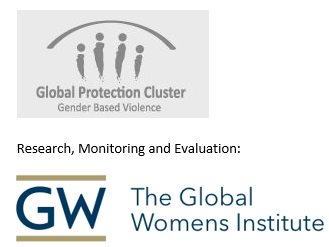While monitoring and evaluation (M&E) systems and emerging research efforts have begun to collect robust data on violence against women and girls (VAWG) in conflict and post-conflict settings, many experts argue that the overall epidemiological understanding of the issue remains limited. Often, data are not systematically collected, utilize weak methodologies and raise ethical questions (The Global Women’s Institute and the International Rescue Committee, 2016; Stark and Ager, 2011). M&E efforts are weak due to limited capacity of practitioners and lack of prioritization of M&E within organizations to collect data in these settings. Similarly, rigorous impact evaluations to document what works to prevent or respond to VAWG are few (The Global Women’s Institute and the International Rescue Committee, 2019).
In recent years, the international community has started to recognize the urgent need for developing a greater understanding of the complexity of VAWG in conflict and post-conflict settings in order to strengthen the evidence base and ultimately improve strategies to prevent, mitigate and respond to this pressing issue. A small evidence base began to develop in 1990s and accelerated in the 2000s as a result of efforts to professionalize the field of humanitarian response and the heightened profile of VAWG during conflict situations, particularly due to the passing of UN Security Council Resolutions 1325 and 1820. Since this time, the field continues to grow and expand with efforts to conduct new and innovative research as well as create more effective routine monitoring and evaluation systems.
When conducting research on VAWG with populations affected by armed conflict or widespread violence, additional challenges exist such as:
- Insecurity that may affect the ability of the research team to access the population
- Transient populations that move locations while the research is underway
- A lack of documentation or agreement about what makes up a study population (e.g. refugee status, recognition of internally displaced populations, etc.)
- Limited funding sources
- A necessary focus on the delivery of life-saving services which are prioritized over research and data collection
In addition, the populations under investigation have intersecting vulnerabilities (e.g. status as survivors, poverty, displacement, etc.) that may also compound the challenges of doing research or collecting data for M&E with these groups. For example, trauma experienced during an incident of VAWG or as part of an armed attacked, may increase ethical considerations for involving this person in research or affect their ability to accurately recall details of events that occurred during traumatic times. Basic research practices, such as obtaining informed consent for participation, can be more challenging in conflict and post-conflict settings. This module will provide some recommendations of best ethical and methodological practices of doing VAWG research and conducting M&E in these settings.
